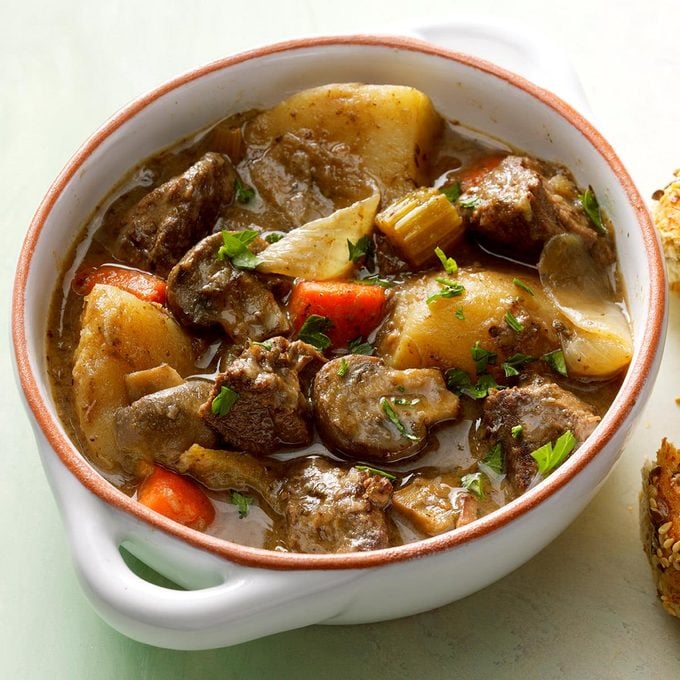
Slow-Simmered Burgundy Beef Stew
My mother-in-law shared this recipe with me about 25 years ago. Ever since then, it's been a go-to whenever I need good food without a lot of fussing. —Mary Lou Timpson, Colorado City, Arizona
Turkey Dumpling Stew
My mom made this stew when I was young, and it was always a hit. Since it's not time-consuming to make I can fix it on a weekend for our children, who love the tender dumplings. —Becky Mohr, Appleton, Wisconsin
Mushroom-Bean Bourguignon
In our family, boeuf bourguignon has been a staple for generations. I wanted a meatless alternative. All this dish needs is a French baguette. —Sonya Labbe, West Hollywood, California
Ancient Grain Beef Stew
My version of beef stew is comfort food with a healthy twist. I use lentils and red quinoa rather than potatoes. If leftover stew seems too thick, add more beef stock when reheating. —Margaret Roscoe, Keystone Heights, Florida

Curry Chicken Stew
My Grandma Inky grew up in India and passed down this recipe to my mother, who then passed it down to me. The recipe brings back fond memories of the family gathered around the table, enjoying this delicious meal and catching up on one another's day. I tweaked the ingredients a bit to fit my toddler's taste buds, but it's just as scrumptious as Grandma's own. —Teresa Flowers, Sacramento, California
Ham and Bean Stew
You only need five ingredients to fix this thick and flavorful stew. It's so easy to make and always a favorite with my family. I top bowls of it with a sprinkling of shredded cheese. —Teresa D'Amato, East Granby, Connecticut

Hungarian Goulash
Talk about your heirloom recipes! My grandmother made this Hungarian goulash recipe for my mother when she was a child, and then Mom made it for us to enjoy. Paprika and caraway add wonderful flavor, and sour cream gives it a creamy richness. It's simply scrumptious! —Marcia Doyle, Pompano, Florida
Creamy Bratwurst Stew
A rich sauce coats this hearty combination of potatoes, carrots and bratwurst chunks. I adapted a baked stew recipe that appeared in a newspaper. This is so comforting on cold winter evenings. —Susan Holmes, Germantown, Wisconsin
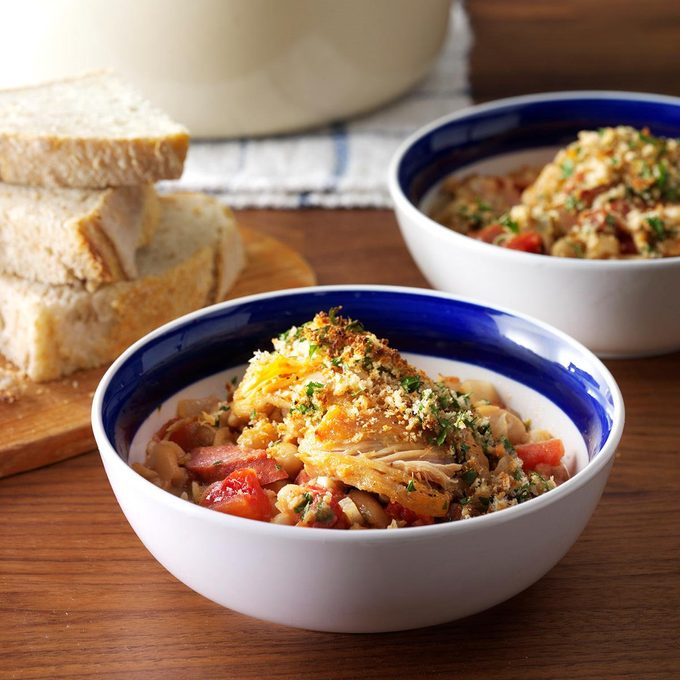
Cassoulet for Today
French cassoulet is traditionally cooked for hours. This version of the rustic dish offers the same homey taste in less time. It's easy on the wallet, too. —Virginia Anthony, Jacksonville, Florida
Spicy Beef Vegetable Stew
This zesty ground beef and vegetable soup is flavorful and fast to fix. It makes a complete meal when served with warm cornbread, sourdough bread or French bread if you enjoy a supper with a side. —Lynnette Davis, Tullahoma, Tennessee
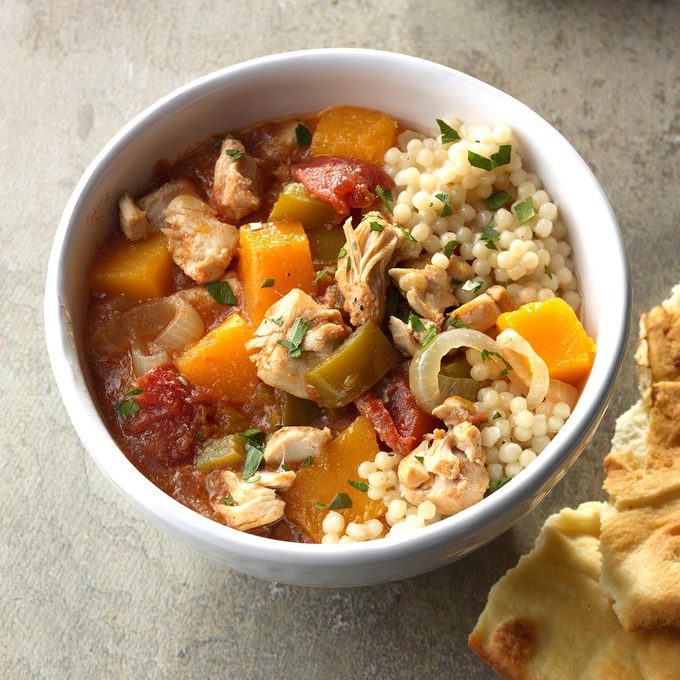
Squash & Chicken Stew
We created a satisfying stew that's nutritious, loaded with flavor and family-friendly. Slowly simmer chicken thighs with stewed tomatoes, butternut squash, green peppers and onion for meal-in-one convenience. —Taste of Home Test Kitchen
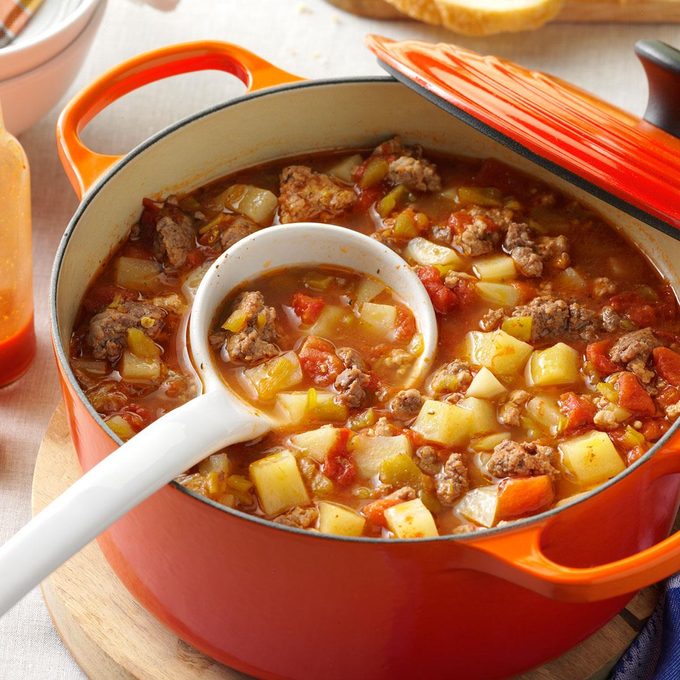
Green Chile Stew
Peppers give this down-home green chili stew a wonderful rich flavor your family will love. —Mary Spill, Tierra Amarilla, New Mexico
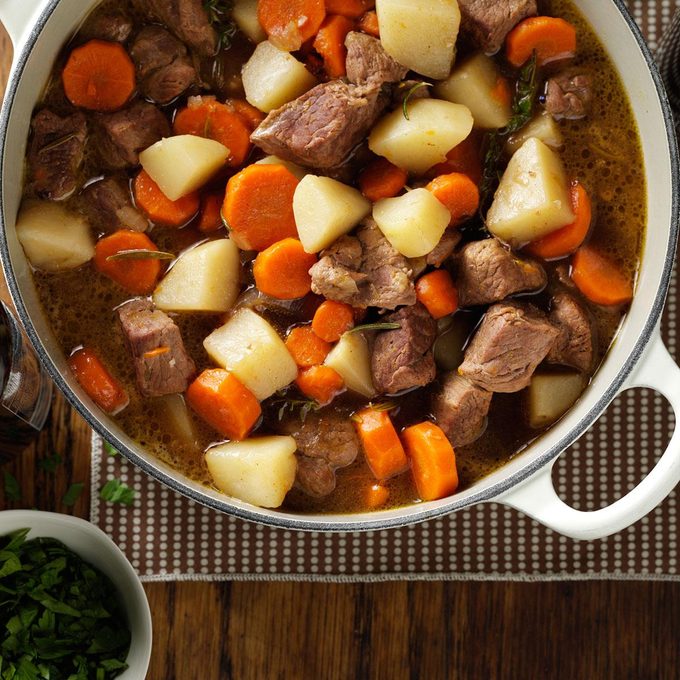
Lamb Stew
My grandmother used to make this stew as a special Sunday meal. It's an unforgettable treat from Ireland. —Vickie Desourdy, Washington, North Carolina
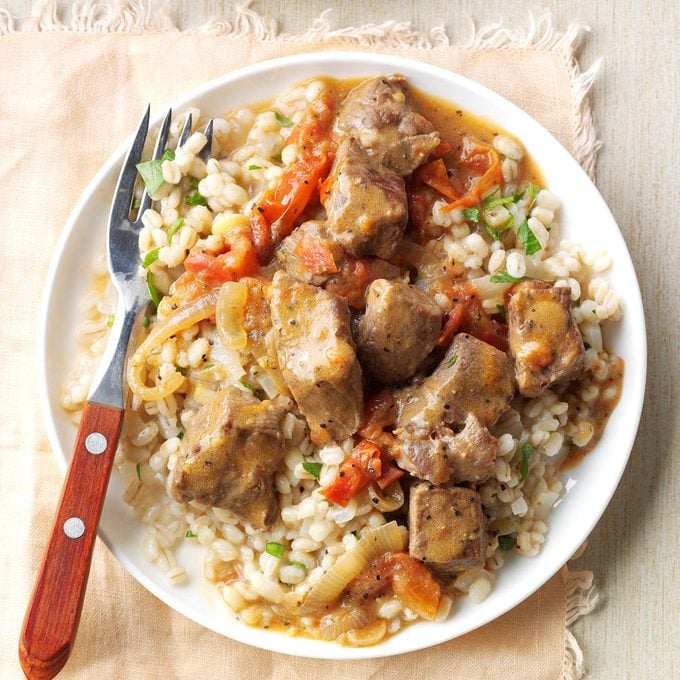
Barley Risotto and Beef Stroganoff
I was missing my Russian grandma's barley porridge and beef stroganoff, so I combined the two dishes. Cook the barley using the risotto method to keep the grains whole and irresistibly chewy. —Tatiana Kireeva, New York, New York
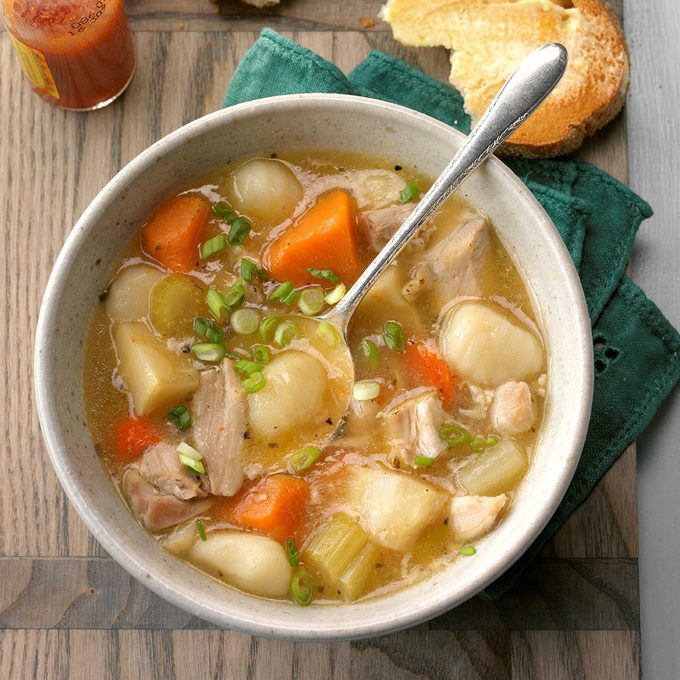
Chicken Stew with Gnocchi
My chicken stew makes the house smell wonderful as it gently bubbles in the slow cooker. One whiff and my family heads to the kitchen to see if it's ready. —Marge Drake, Juniata, Nebraska
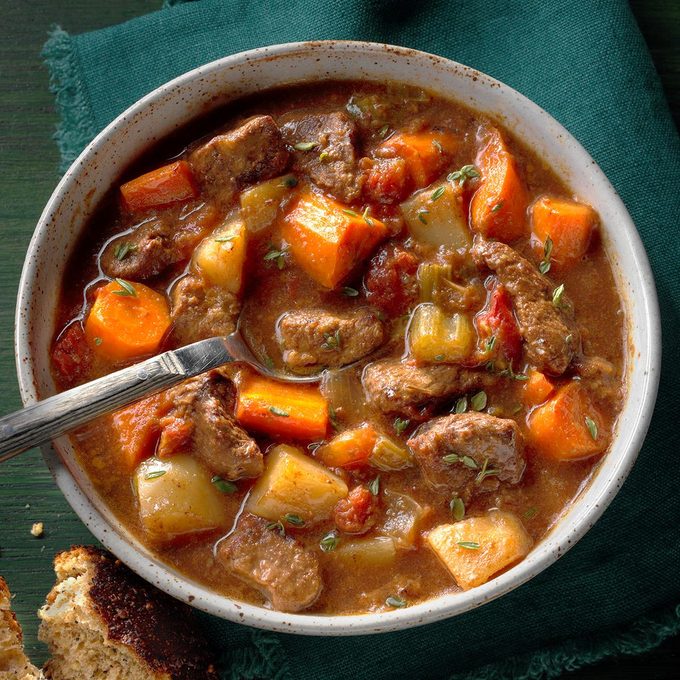
Slow-Cooker Beef Stew
When there's a chill in the air, nothing beats this Crock-Pot beef stew. Seasoned with thyme and dry mustard, the hearty slow-cooker beef stew is chock-full of tender carrots, potatoes and meat. —Earnestine Wilson, Waco, Texas

Slow-Cooker Burgundy Beef
When my adult children are coming over for dinner, this is the request. All three of them, and their significant others, love this dish. Yum! — Urilla Cheverie, Alfred, Maine
Sweet Potato Stew
Beef broth and herbs complement the potatoes' subtle sweetness in this hearty stew that's perfect for fall. — Helen Vail, Glenside, Pennsylvania

New Year's Oyster Stew
Oyster stew is quite popular along the coast of Ireland, where oysters are served to celebrate many festivals. Immigrants brought the recipe with them to the Atlantic and Gulf coasts of the U.S. —Christa Scott, Santa Fe, New Mexico
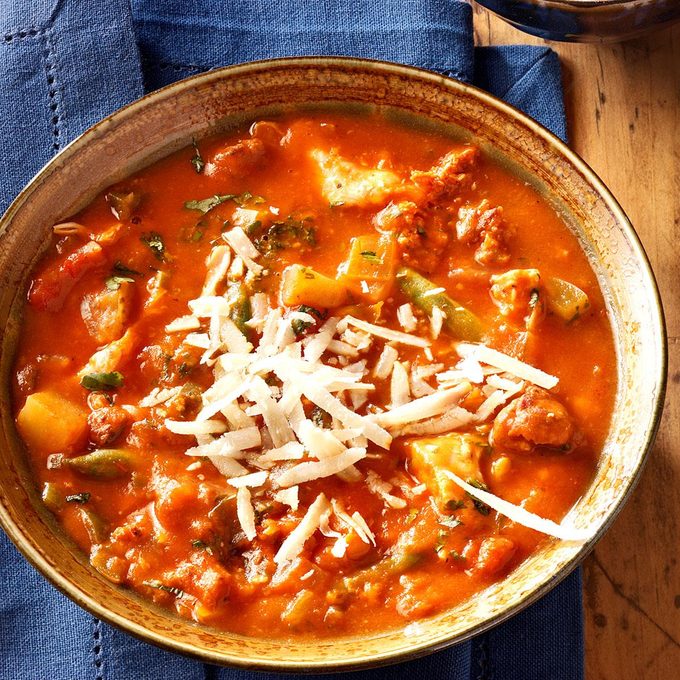
Fiesta-Twisted Brunswick Stew
Traditionally made with game meat, this updated Brunswick stew, using spicy sausage, is a modern mom's best friend. —Donna Marie Ryan, Topsfield, Massachusetts
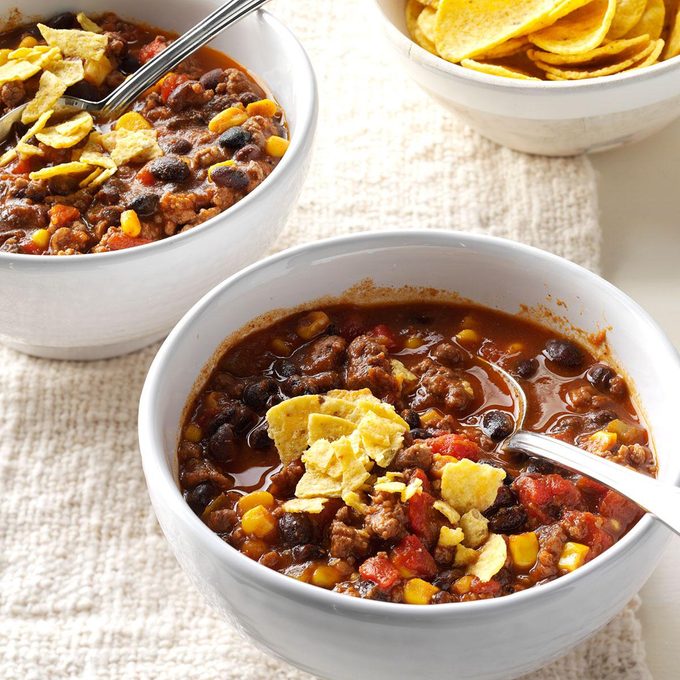
Taco Stew
The ingredients are simple, but together they make this awesome stew. If you want to a little added crunch, crush a few tortilla chips on top of each bowl. —Suzanne Francis, Marysville, Washington

Quicker Chicken and Dumplings
Ready in 30 minutes, this easy chicken and dumplings recipe takes advantage of convenience items and uses time-saving, drop-style dumplings. —Willie DeWaard, Coralville, Iowa
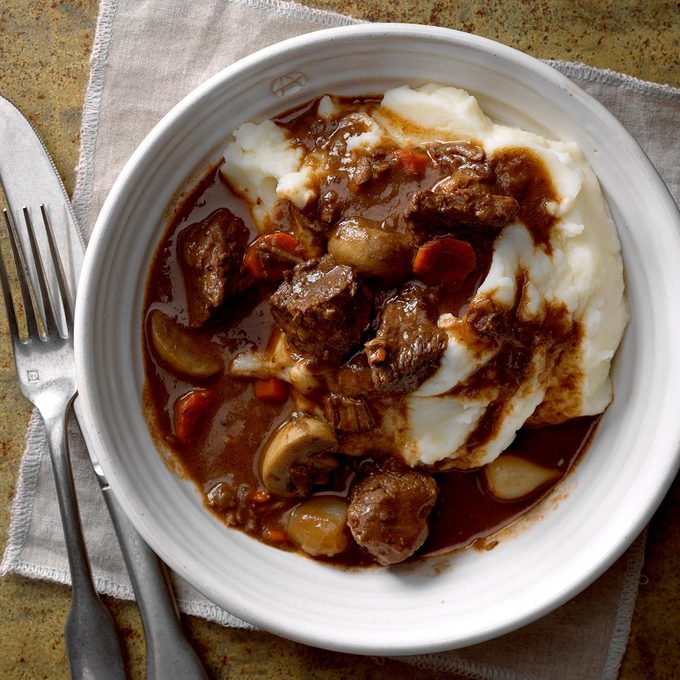
Beef Bourguignon
This stovetop stew is loaded with taste, but is easy to do. While the name sounds fancy, even a beginning cook can master it. It's our traditional holiday meal.—Elodie Rosinovsky, Brighton, Massachusetts
Sweet Potato Lentil Stew
I fell in love with the spicy aromas in this slow-cooked lentil stew. Add whatever ingredients you have on hand, like zucchini, spinach, kale and corn. —Heather Gray, Little Rock, Arkansas
Hearty Beef & Sweet Potato Stew
I have fond memories of growing up in an Irish-Italian family and learning to cook from my grandparents. Beefy stew reminds me of their precious contributions. —Renee Murphy, Smithtown, New York
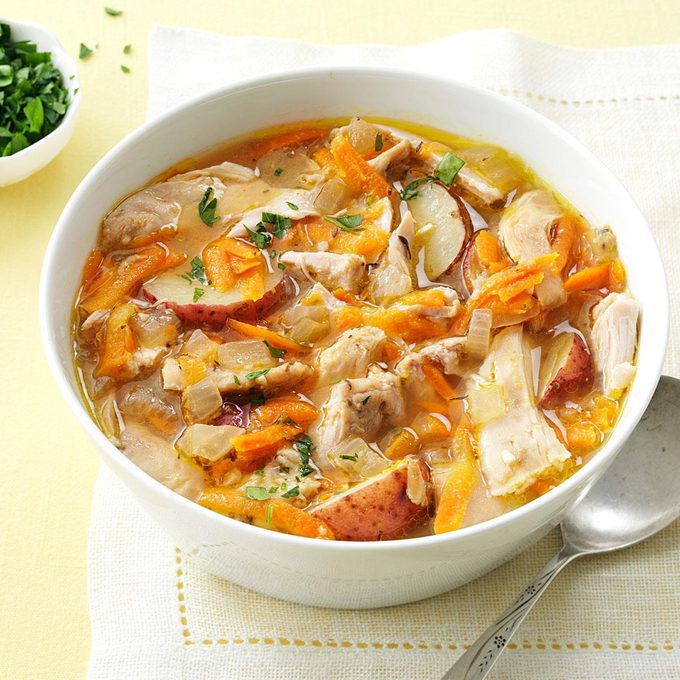
Spring-Thyme Chicken Stew
During a long winter (and spring), my husband and I were in need of something warm, comforting and bright. This chicken was the perfect thing. It fills the house with the smell of home when Mom would make chicken soup, with a little something extra. —Amy Chase, Vanderhoof, British Columbia
Beef Stew with Pasta
I have happy memories of my mother's tomato-y beef stew, so I combined her recipe with a bunch of fall veggies I needed to use. The result was a fun, fill-you-up dinner. —Kristen Heigl, Staten Island, New York
Braised Pork Stew
Pork tenderloin becomes amazingly tender in this braised stew. It's a fantastic meal for a cold winter night. —Nella Parker, Hersey, Michigan

Weekday Beef Stew
Beef stew capped with flaky puff pastry adds comfort to the weeknight menu—my family is always glad to see this meal. Make a salad and call your crowd to the table. —Daniel Anderson, Kenosha, Wisconsin
Slow-Cooked Lentil Stew
This vegetarian stew is perfect when you want to take a break from meat. Adding the cream at the end gives it a smoother texture.—Michelle Collins, Suffolk Virginia
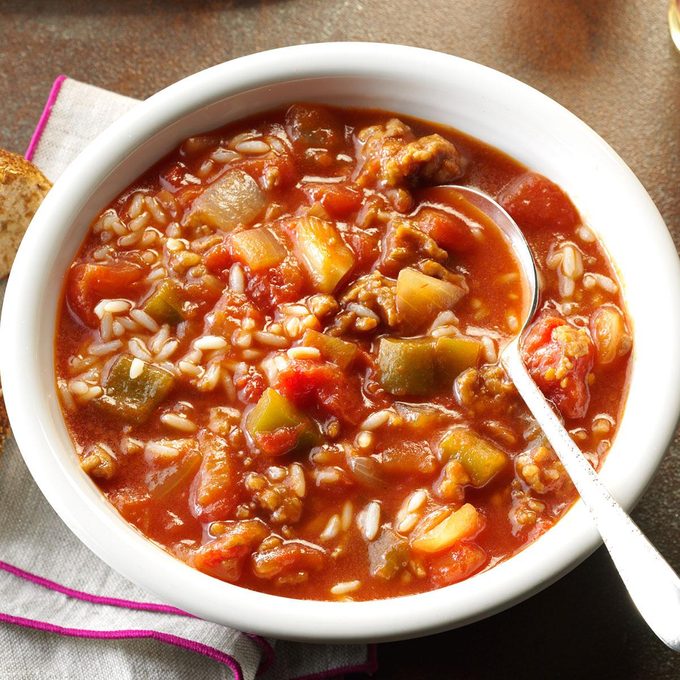
Slow-Cooked Stuffed Pepper Stew
This is my go-to pepper stew. When my garden yields green peppers, I dice and freeze them for those cold, blustery days to come.—Debbie Johnson, Centertown, Missouri
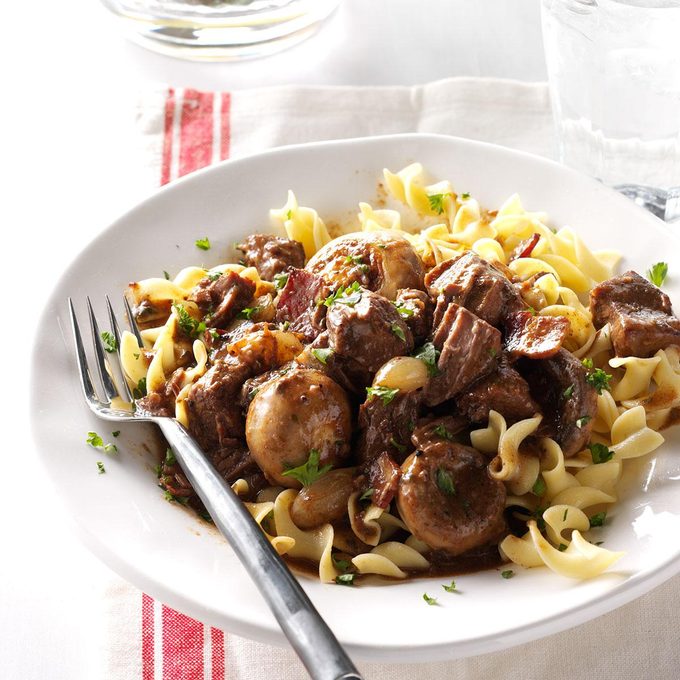
Holiday Beef Bourguignon
When we married four decades ago, I found this bourguignon recipe in a French cookbook. My husband and I still serve it for very special occasions. —Lyn Robitaille, East Hartland, Connecticut
Stovetop Root Vegetable Beef Stew
To me, the definition of "cozy" is a pot of tender beef simmering with sweet potatoes and parsnips. It doesn't get better than that. —Beth Rossos, Estacada, Oregon
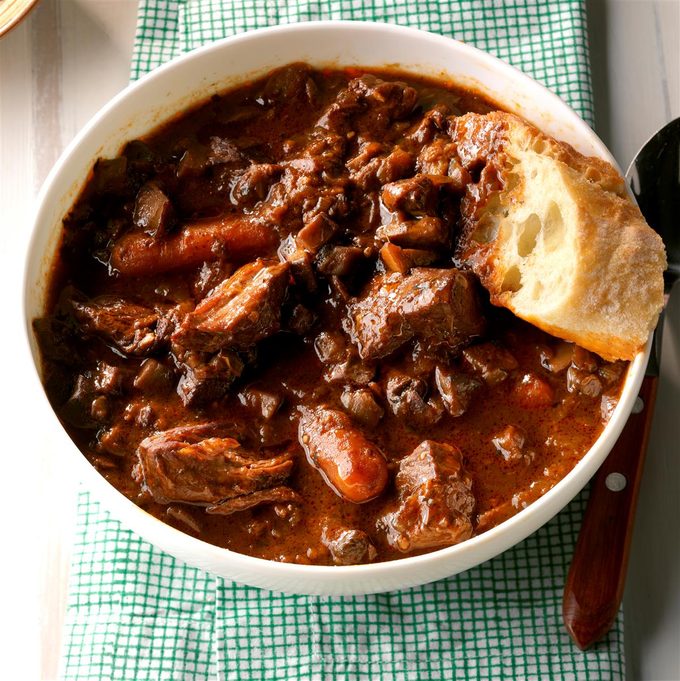
Mainly Mushroom Beef Carbonnade
This is the ultimate comfort food, an earth-and-turf combo that smells delicious while cooking and tastes like home. The mushrooms taste so meaty, you can decrease the amount of beef and add more portabellos if you like. —Susan Asanovic, Wilton, Connecticut
Cazuela
I learned to make this dish while we were living in Chile for a few months. We grow extra butternut squash in our garden just for this recipe. —Louise Schmid, Marshall, Minnesota
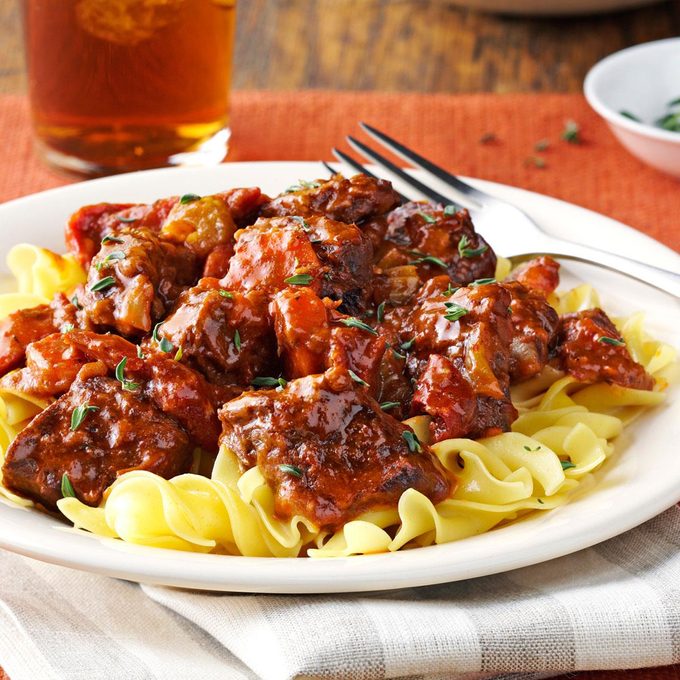
Beef Stew Provencal
When I was young, my favorite food to order in a restaurant was beef stew. My mother and I decided to create our own and experimented with different ingredients until we came up with this recipe. Everyone liked this slow cooker version so much that now it's a tradition every time the whole family is together. —Chelsey Larsen, Sparks, Nevada
Ravin' Good Stew
This stew is loaded with ingredients. It's sure to fill up the kids before they head out trick-or-treating, and the family enjoys it all season long! —Shirley Smith, Yorba Linda, California
African Peanut Sweet Potato Stew
Back when I was in college, my mom made an addicting sweet potato and peanut stew. I shared it with friends, and now all of us serve it to our own kids. They all love it, of course. —Alexis Scatchell, Niles, Illinois
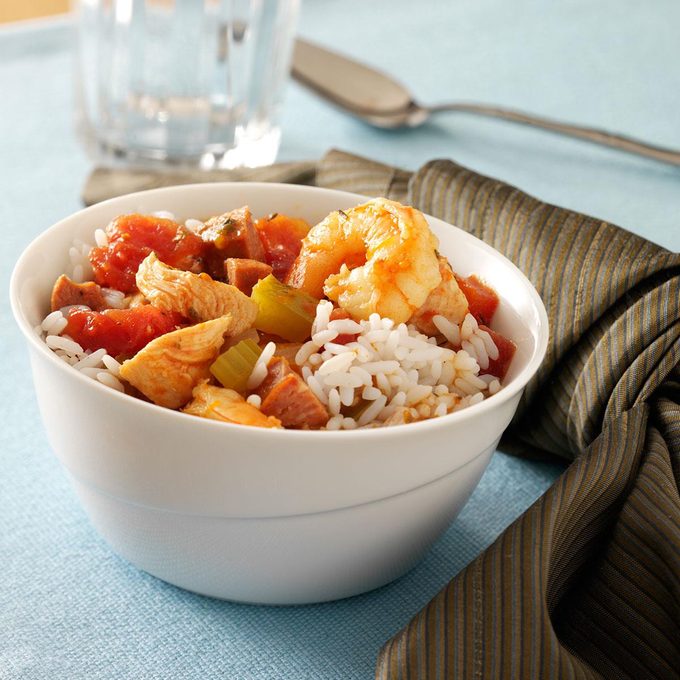
Slow-Cooked Hearty Jambalaya
I love anything with Cajun spices, so I came up with this slow-cooker jambalaya that's just as good as that served in restaurants. If you can't find Andouille sausage, hot links, smoked sausage or chorizo will also work. I like to serve it with warm cornbread and garnished with sliced green onions. —Jennifer Fulk, Moreno Valley, California
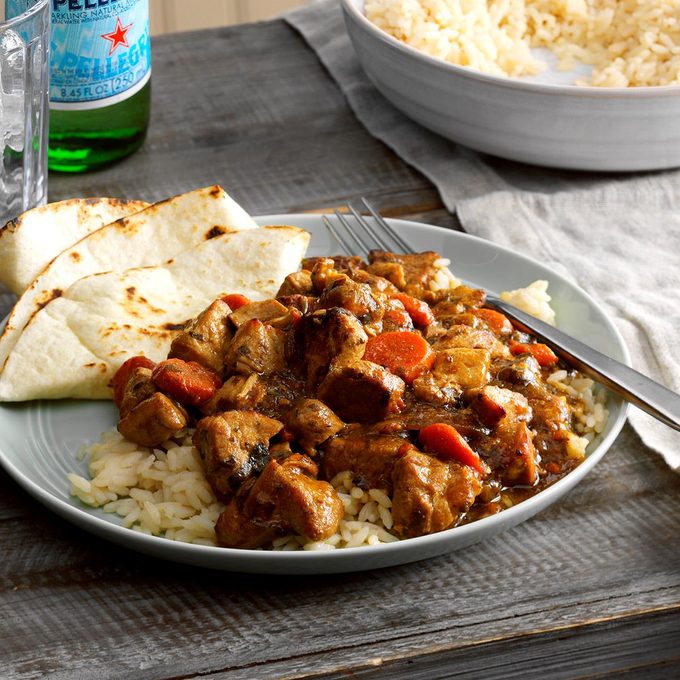
Pork Chile Verde
Pork slowly stews with jalapenos, onion, green enchilada sauce and spices in this flavor-packed Mexican dish. It's wonderful on its own or stuffed in a warm tortilla with sour cream, grated cheese or olives on the side. —Kimberly Burke, Chico, California
Artichoke Beef Stew
The recipe for this special stew was given to me by a dear friend before she moved to another state. She served it with dumplings, but my husband prefers noodles. —Janell Schmidt, Athelstane, Wisconsin
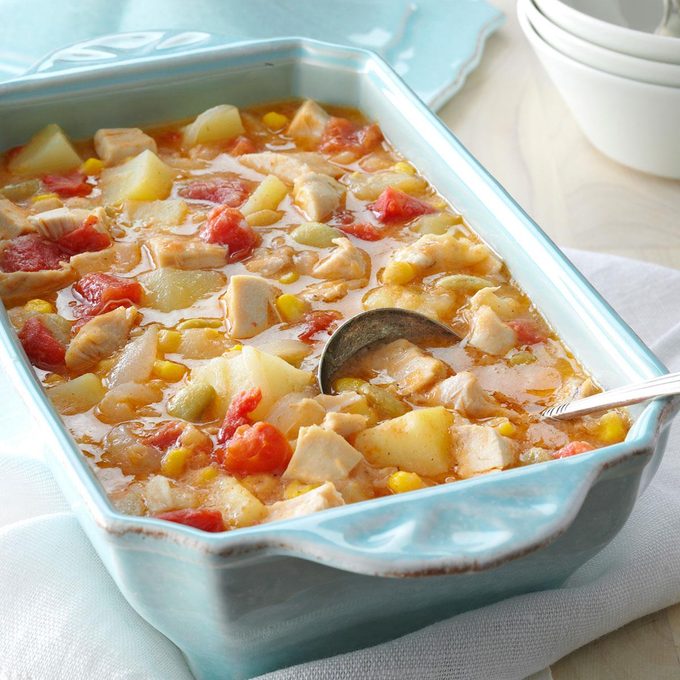
Hearty Brunswick Stew
Like a thick, hearty soup, this stew is packed with tender chicken and an eye-catching combination of vegetables. I could never wait patiently to eat when Mother was cooking this stew. —Milded Sherrer, Fort Worth, Texas
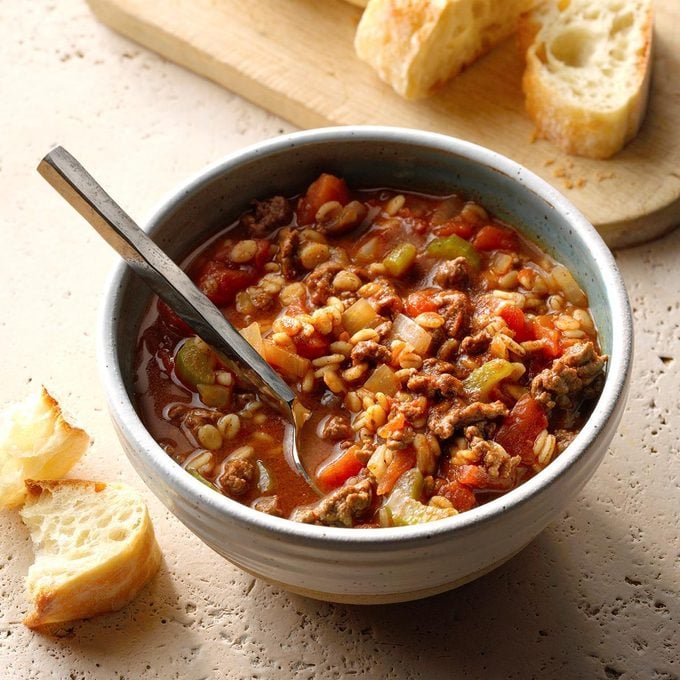
Southwestern Beef Barley Stew
Hearty and easy to fix, this thick stew has a comforting, chili-like flavor. It's my best barley recipe. I'm sure you'll agree that it's a tasty dish. —Lisa Kolenich, Regina, Saskatchewan

Slow Cooker Beef Vegetable Stew
Come home to warm comfort food! This vegetable beef stew is based on my mom's wonderful recipe, but I adjusted it for the slow cooker. Add a sprinkle of Parmesan to each bowl for a nice finishing touch. —Marcella West, Washburn, Illinois
Turkey Biscuit Stew
This chunky stew makes a hearty supper, especially in the fall and winter. It'salso a great way to use extra turkey during the holidays. —Lori Schlecht, Wimbledon, North Dakota
Favorite Hamburger Stew
I got this hamburger stew recipe from a woman at our church, Lois Henry, when I needed a way to use up our bounty of home-canned tomatoes. My husband loves it, and I like that it's easy to warm up for a carefree dinner in the winter months. —Marcia Clay, Truman, Minnesota
Great Northern Bean Stew
This thick and hearty stew with great northern beans is sure to chase the winter chills away. —Mildred Sherrer, Fort Worth, Texas

Stephanie's Slow-Cooker Stew
Start this warming one-pot meal before you head out for the day. By the time you get home, the well-seasoned meat will be tender and mouthwatering. —Stephanie Rabbitt-Schappacher, Cincinnati, Ohio

Beef & Mushroom Braised Stew
Every spring, my family heads out to our timber acreage to collect morel mushrooms, and then we cook up this stew. We use morels, of course, but baby portobellos or button mushrooms or will work, too. —Amy Wertheim, Atlanta, Illinois
Sausage & Kale Lentil Stew
I made a pot of this awesome soup when visiting my sister and her family. Now, I'll bring it along when I stop by or pack up a few containers for my nephew, who appreciates a home-cooked meal while he's off at college. —Tiffany Ihle, Bronx, New York

Moroccan Vegetable Chicken Tagine
Take a trip to Morocco with this rich, exotic dish. A tagine is a North African slow-cooked stew named after the pot it's cooked in.—Taste of Home Test Kitchen
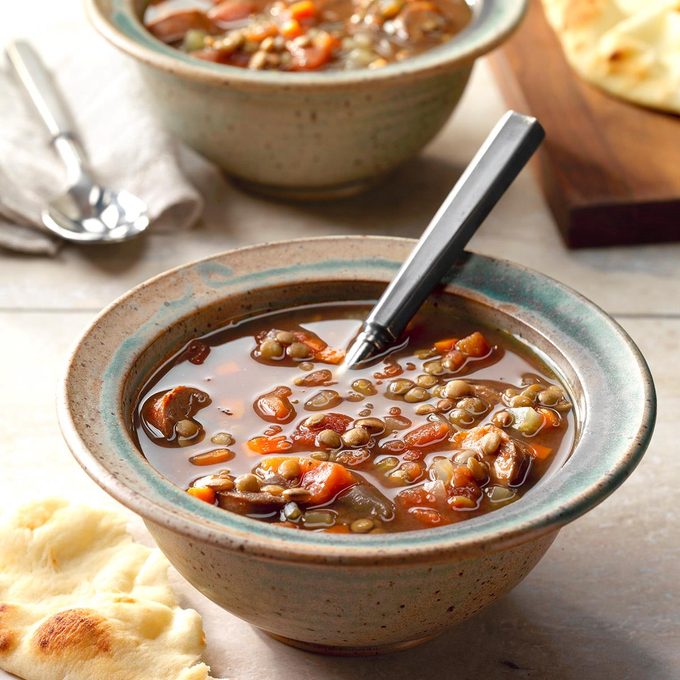
Lentil & Chicken Sausage Stew
This hearty and healthy stew will warm your family right down to their toes! Serve with cornbread or rolls to soak up every last drop. —Jan Valdez, Chicago, Illinois
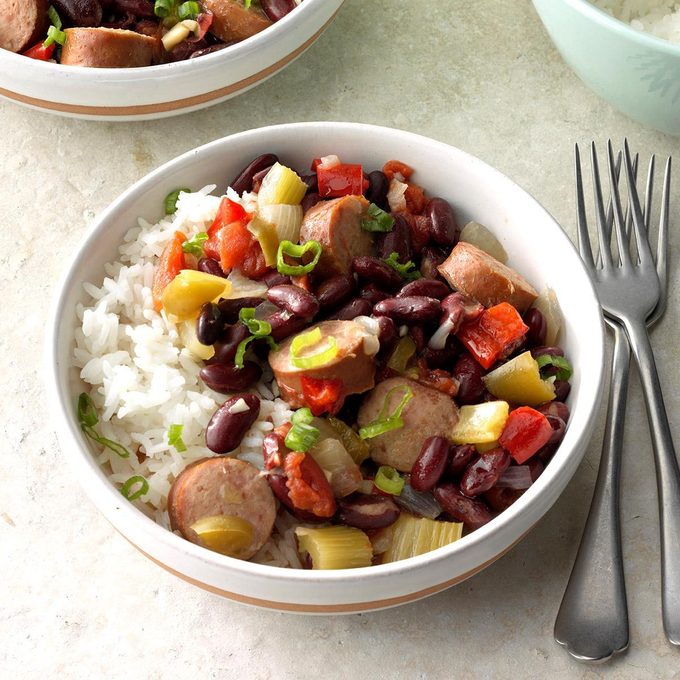
Louisiana Red Beans and Rice
Smoked turkey sausage and red pepper flakes add zip to this saucy, slow-cooked version of the New Orleans classic. For extra heat, add red pepper sauce at the table. —Julia Bushree, Georgetown, Texas
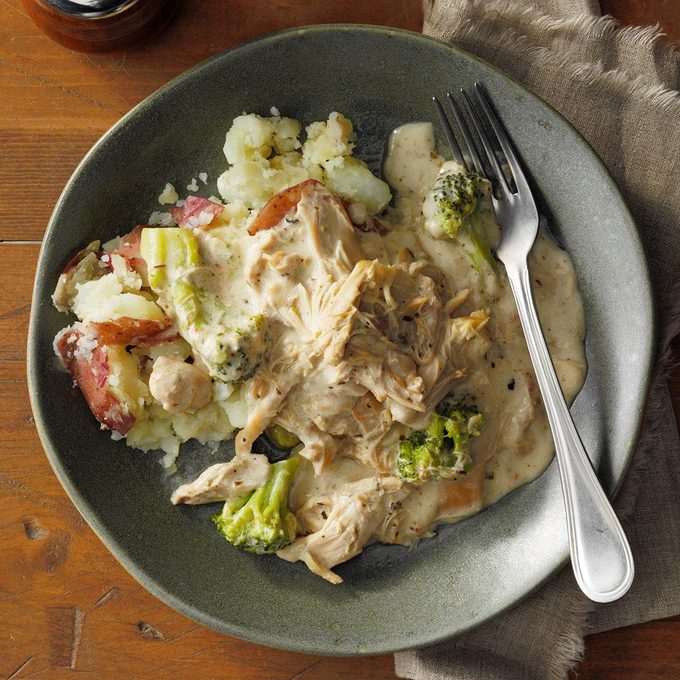
Creamy Chicken & Broccoli Stew
Shh! Don't tell anyone! This recipe is so simple, but you'd never know it. My husband, who normally doesn't like chicken, asks for this dish regularly. —Mary Watkins, Little Elm, Texas
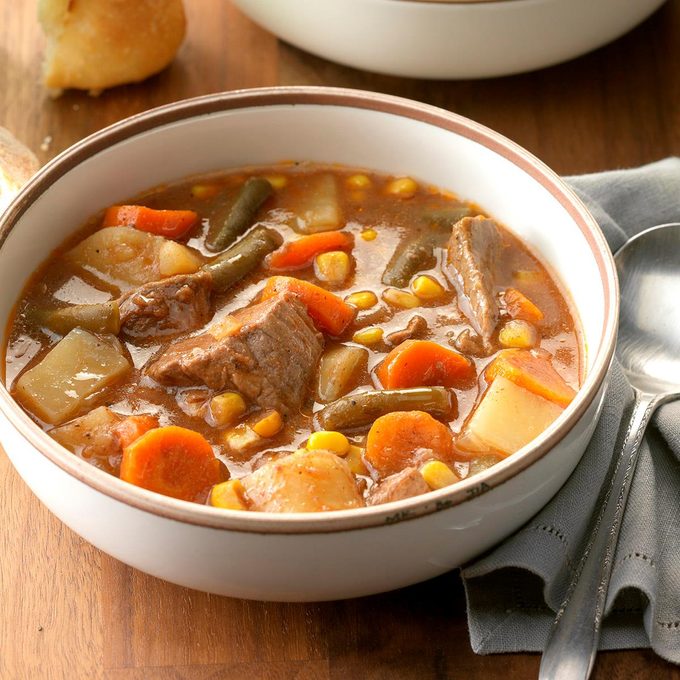
Satisfying Beef Stew
This beef stew is so hearty and tastes even better the next day—if there are leftovers! It goes great with cornbread or any crusty loaf. —Abbey Mueller, Enid, Oklahoma
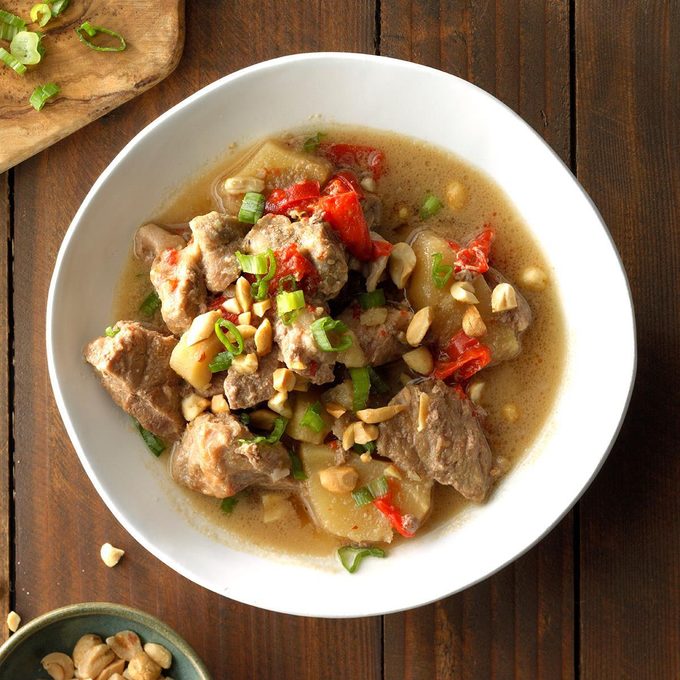
Satay-Style Pork Stew
Thai cuisine features flavors that are hot and sour, salty and sweet. This one-dish pork satay balances all of them using ginger and red pepper flakes, rice vinegar, garlic, lime juice and creamy peanut butter. —Nicole Werner, Ann Arbor, Michigan
Southwestern Chicken & Lima Bean Stew
I love to have my daughter, son-in-law and grandchildren over for this supper. They make me so happy with their compliments or just by going to fill up their bowls again. It's a good-for-you hit. —Pam Corder, Monroe, Louisiana
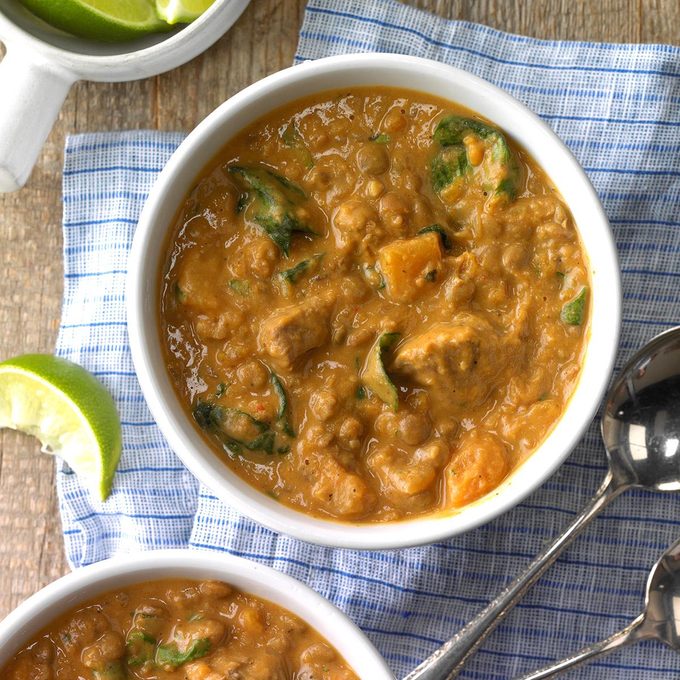
Squash and Lentil Lamb Stew
My family lived in New Zealand many years ago. Every Sunday my mother made a lamb stew—it was Dad's favorite! I changed the recipe to suit my family's more modern palates, but it still seems just as exotic and delicious. —Nancy Heishman, Las Vegas, Nevada
Chicken Vegetable Curry
This comfort dish gets fabulous flavor when I add chicken, sweet red peppers, coconut milk and the all-important seasoning, curry powder. —Roxana Lambeth, Moreno Valley, California

Beef Daube Provencal
This dish is perfect on cold winter days, especially after we have been out cutting wood or white-tail hunting. If you are lucky enough to have venison, try it here for melt-in-your-mouth goodness. —Brenda Ryan, Marshall, Missouri
Meatball Chili with Dumplings
My family enjoys this delicious recipe—it's like a spicy meatball stew with dumplings!—Sarah Yoder, Middlebury, Indiana

Classic Beef Stew
This easy beef stew recipe is my favorite. The rich beef gravy helps the hearty flavor of the potatoes and carrots to come through. It's the perfect homemade dish for a blustery winter day. —Alberta McKay, Bartlesville, Oklahoma
Apple Chicken Stew
My husband and I enjoy visiting the apple orchards in nearby Nebraska City. We always make sure to buy extra cider to use in this sensational slow-cooked stew. —Carol Mathias, Lincoln, Nebraska
Portobello Beef Burgundy
Rely on the convenience of your slow cooker for a meal that boasts all the hearty, stick-to-your-ribs goodness your family craves. These tender cubes of beef—loaded with a fantastic mushroom flavor and draped in a rich, burgundy sauce—are sure to have your guests asking for seconds of this potluck pleaser! —Melissa Galinat, Lakeland, Florida






































0 Response to "How to Cut Beef for Stew"
إرسال تعليق